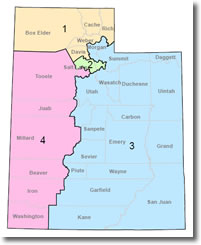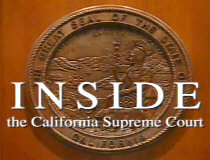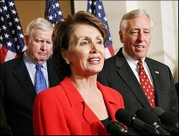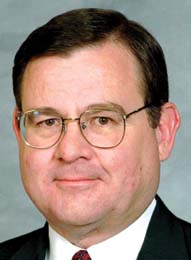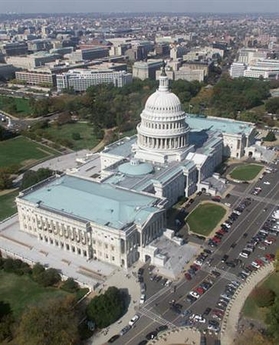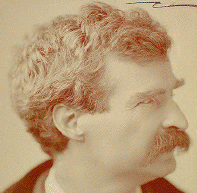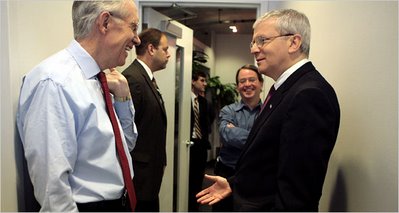By CALVIN WOODWARD, Associated Press Writer 11 minutes ago
WASHINGTON - Voters put the Republican congressional majority and a multitude of new voting equipment to the test Tuesday in an election that defined the balance of power for the rest of George W. Bush's presidency.
Both parties hustled to get their supporters out in high-stakes contests across the country, Republicans conceding nothing as their vaunted get-out-the-vote machine swung into motion, Democrats appearing confident and appealing one more time for change.
Democratic Sen.
Hillary Rodham Clinton' name=c1> SEARCH
News News Photos Images Web' name=c3>
Hillary Rodham Clinton of New York seconded her party's mantra, with one qualification.
"I voted for change, except for me," she said, casting her ballot with her husband Bill, the former president, in Chappaqua, N.Y.
Voting at sunrise, Bush switched from partisan campaigner to democracy's cheerleader as he implored Americans of all political leanings to cast ballots.
"We live in a free society and our government is only as good as the willingness of our people to participate," Bush said, his wife, Laura, at his side and an "I voted" sticker on the lapel of his brown suede jacket. "Therefore, no matter what your party affiliation or if you don't have a party affiliation, do your duty, cast your ballot and let your voice be heard."
The
Iraq' name=c1> SEARCH
News News Photos Images Web' name=c3>
Iraq war, as predicted, was prominently on people's minds.
Separated by age, party of choice and their position on the war, Melanie Tate, 22, in Louisville, Ky., and Mario Georgalas, 41, in Miami Beach both spoke of the energizing experience of voting.
"I was more excited the first time I got to vote than the first time I got to drive," Tate, 22, a political science student and head of the University of Louisville Democrats, said after casting her ballot.
"We're seeing our friends going to the war. A lot of us are voting for Democratic candidates who will work to end the war," Tate said.
Georgalas cast his ballot on the way to work. "I was in the Navy for six years, that's why I vote," he said. He voted for the GOP ticket because he didn't believe the U.S. should leave Iraq.
"What you start," he said, "you should finish."
About a third of voters were using new equipment, and problems in several states were reported right out of the gate. The government deployed a record number of poll watchers to the many competitive races across the country.
Glitches delayed balloting in dozens of Indiana and Ohio precincts, and Illinois officials were swamped with calls from voters complaining that poll workers did not know how to operate new electronic equipment. In Delaware County, Ind., officials planned to seek a court order to extend voting after an apparent computer error prevented voters from casting ballots in 75 precincts.
Florida officials, working to avoid a repeat of the vote-counting debacle of 2000, fielded extra voting machines, paper ballots and poll workers. In the Jacksonville suburb of Orange Park, Fla., voters were forced to use paper ballots after an electronic machine broke.
The uncertainty of it all made many jittery, candidates included.
In Tennessee, where Republican Bob Corker and Democrat Harold Ford Jr. were in a pitched battle for a Senate seat, even a spotty rain made Corker edgy.
"Any candidate doesn't like to see rain," Corker said, greeting supporters on a damp Tuesday morning in Kingsport. "You don't know what kind of variables that brings into it."
His opponent, bidding to become the first black senator from the South since Reconstruction, declared the election to be in "God's hands" as he stood a respectful distance from the Lindenwood Christian Church, doubling as a polling station.
But Ford wasn't leaving everything to divine fate. When he spotted voters standing in the church doorway, he shouted: "I would come up there but I don't want to get in trouble. I'd appreciate it if you'd vote for me."
At stake in the midterm election were all 435 House seats, 33 in the Senate, 36 races for governor, ballot measures on gay marriage, embryonic stem cell research, the minimum wage and more — plus the overarching fate of Bush's agenda in the last two years of his presidency.
Democrats hoped finally to answer the rout that drove them from legislative power in 1994. Despite brave words for public consumption, Republicans worried that control of the House would slip from their hands.
Even Senate control was up in the air, but a tougher climb for Democrats.
Democrats needed to gain 15 House seats or six in the Senate to form a majority, a development that would give them a stronger voice against a war that has cost more than 2,800 U.S. lives and has come to be seen by most Americans as misbegotten.
Sharply critical of Bush's prosecution of the war throughout the campaign, Democrats nevertheless lack a common position on how to get the U.S. out.
Republicans have been the acknowledged champions at getting supporters out to polling stations, a critical skill in midterm elections when turnout is typically low, around 40 percent, and one that heightened suspense over which party would hold the levers of power at the end of the counting.
Evangelical conservatives are the foundation of that mobilization and motivation drive, but their own enthusiasm was in question as they faced the prospect of a president too politically weak to take forward their agenda and looked back on a campaign tainted by the congressional page sex scandal and more.
Even so, some final opinion polls indicated a tightening race; others suggested the Democrats were still far in front in national sentiment.
At least two dozen Republican House seats were at risk. Among GOP-held open seats, those in Arizona, Colorado, New York, Ohio and Iowa seemed most vulnerable. Republican Reps. John Hostettler, Chris Chocola and Mike Sodrel of Indiana; Charles Taylor of North Carolina; Curt Weldon, Don Sherwood and Melissa Hart of Pennsylvania; and Charles Bass of New Hampshire were in particularly difficult re-election struggles.
In Senate races, Republican incumbents Mike DeWine in Ohio and Rick Santorum in Pennsylvania appeared in deepest trouble; Sens. Lincoln Chafee in Rhode Island and Conrad Burns in Montana somewhat less so.
Rep. Nancy Pelosi (
news,
bio,
voting record) of California, in line to become the first woman speaker in history if Democrats win, was in Washington after a weekend of campaigning for candidates in Pennsylvania and Connecticut.







